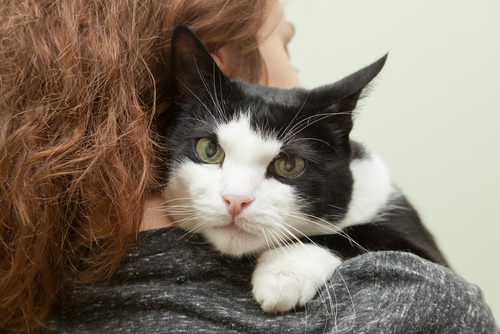
First there was a study that suggested that schizophrenia and other mental illnesses were linked to infection with the parasite, toxoplasmosis. Toxoplasma organisms are tiny and can live inside us. Some say that over 50% of people worldwide have been exposed to Toxoplasmosis.
Because domestic cats can be a source of this infection (as can eating raw meat and gardening without gloves), it was big news in the cat world. People were making tasteless jokes about the “crazy cat lady” being a real phenomenon. The theory was that the organism has evolved to create impulsive behaviors in the host that would favor the spread of the disease. It is frightening to think that over half of us could be at greater risk of mental illness and the story lit up the internet like a fire. However, since humans are no longer preyed upon by feline species, this seems an ineffective adaption in today’s world.
Now there is a study that refutes the initial claim. Thankfully, researchers at Duke University found no link between the toxoplasma titers and human psychiatric disorders. ¹
But is the idea completely unfoudned? Shockingly, although the Duke study could find no link between mental changes for humans, another study very recently published in Current Biology found the opposite effect for the chimpanzee, who is a primate that is still preyed upon by feline species. Amazingly infected chimps showed an abnormal attraction to the urine of leopards, a natural predator. Normal chimps would avoid the marking of a leopard since it is a sign that an area is marked and inhabited by a leopard. Self-preservation would encourage a chimpanzee to avoid such areas. ²
When the study looked at the chimps’ response to other feline urines, they saw no difference between infected and non-infected animals. This behavior modification could increase the probability that the infected chimps would be preyed upon, further enhancing the spread of the toxoplasma parasite. Could this this be an adaption that the organism has developed over time or just an unusual side effect? We may never know, but it is an very interesting finding.
The good news is that humans do not seem to suffer bizarre effects (other than the typical health effects most relevant to those that are pregnant or immune suppressed). However it is very interesting to note that these little parasites do seem to have adapted in ways that favor the spread of illness in chimpanzees. Science is fascinating and more investigation is probably forthcoming on this intriguing phenomenon. Don’t be afraid of your cat, but do be awed by nature.
Want to learn more cool cat science? Follow me on Facebook.
- Is Toxoplasma Gondii Infection Related to Brain and Behavior Impairments in Humans? Evidence from a Population-Representative Birth Cohort Karen Sugden ,Terrie E. Moffitt,Lauriane Pinto,Richie Poulton,Benjamin S. Williams,Avshalom Caspi PLOS,Published: February 17, 2016 DOI: 10.1371/journal.pone.0148435
- Morbid attraction to leopard urine in Toxoplasma-infected chimpanzees. Curr Biol.2016 Feb 8;26(3):R98-9. doi: 10.1016/j.cub.2015.12.020, Poirotte C, Kappeler PM, Ngoubangoye B Bourgeois S, Moussodji M, Charpentier MJ.

